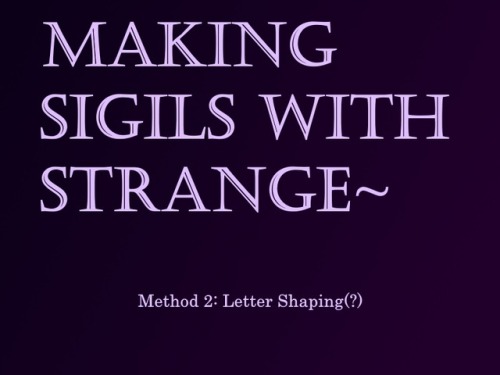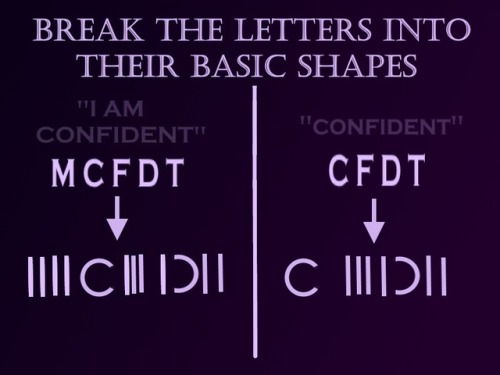“Empress Emily Kaldwin. I’m A Friend Of Your Father’s From The Bad Old Days.”




“Empress Emily Kaldwin. I’m a friend of your father’s from the bad old days.”
More Posts from Othermanymore and Others
imagine if the oceans were replaced by forests and if you went into the forest the trees would get taller the deeper you went and there’d be thousands of undiscovered species and you could effectively walk across the ocean but the deeper you went, the darker it would be and the animals would get progressively scarier and more dangerous and instead of whales there’d be giant deer and just wow






I don’t really know what people generally call this method of sigil making, so I’m just calling it “Letter Shaping” because you’re using the basic shapes from certain letters. This is the most common form of sigil making, and it allows the most creative influence. As you see above the sigils are for nearly the same thing, yet the sigils came out completely different. Not because the purpose was different, but because I approached them both a different creative way, and that’s what I like so much about this method. There’s a lot of freedom and personalization involved.
(UPDATE: Here’s a link to a guide on how to deconstruct letters down to basic shapes)
stuff i’ve learned about writing after 10 weeks in an MFA program
so as some of you might know, i’m currently going to grad school for writing fiction and creative nonfiction. it’s a well-respected program, fully funded, with fantastic faculty and excellent classes. i’m learning a lot, so i thought even though i’m only just getting started (it’s a 2-year program), i’d share some stuff i’ve learned.
all writing is valid. scribbling a poem onto a cocktail napkin at an awkward family function is just as worthy of careful literary analysis as Faulkner. i’ve read stories and thought this is the worst thing i’ve ever read, i can’t take this seriously and then watched as established, widely published authors and academics provided a thoughtful and thorough criticism of it. treat all writing with respect, your own included.
all research is valid. i went on a rant about BDSM politics in queer culture, and this boy, who looked totally bewildered, asked me what BDSM was. after (hopefully) tactfully explaining it to him, he asked me, “so is that like…your research or something?” to which i replied, “…you could say that.” what i mean is, anything you are curious about is worthy of your attention and curiosity. anything you want to learn is worth learning. there is no such thing as a guilty pleasure when it comes to education.
good writing is a facet of place. the reason i think we believe our writing and research isn’t valid is because we are writing and researching in spaces that are not conducive to our interests. and when we see ourselves not yielding to those which we compare ourselves, it’s easy to think we’re “bad writers.” the key is to find places (publications, platforms, people, etc) that match your aesthetic, somewhere that your work might belong.
think of it this way: if you go to a function filled with foodies in formal wear talking about their yachts, you’re not going to bring celery sticks with peanut butter and raisins. that doesn’t mean ants on a log are a bad snack, but that this party is the wrong place for it. you bring that snack to a kid’s birthday party where you’ll probably have more fun anyway, and suddenly you’re a five-star chef.
don’t conform. take risks. this is something my workshop leader told me when i was concerned about workshopping my novella, and i told her i wanted to “tone it down.” i have gathered that the people who are considered experts in the field of writing are generally all looking for two things in any given work: creativity and whether or not the piece is doing something. (i’ll comment on the latter in the next point.) creativity is about being weird, about making things that don’t exist yet, using your knowledge of the world and filling in all the gaps with your own design. creativity is not about conforming to anyone else’s standards or expectations.
write to “do something” or create a conversation. admittedly i’m pretty accustomed to writing for the sake of self indulgence, which is great for inspiring first drafts but terrible for everything else. i’ve read works where the purpose of them was the complete romanticization or commentary of the self, and while that’s fine for people who already possess considerable ethos (re: celebrities), for people without it, these works aren’t adding to any conversation on any topic besides that writer’s introspection. (note, this is not “bad writing”; it just has a different place, generally a private journal.)
in the world of fanfic, we are all inherently adding to the conversation of a given canon. without that foundation, in the literary world your canon has to become something else: stories about big picture concepts like grief or oppression; stories subverting a popular generalization; stories that give new light to something. genre is thus not about conformity, but having a creative conversation with people who are interested in the same things you are. writing is about inserting yourself into the dialogue, adding to the lexicon of something greater than yourself.
where this breaks down, however, is the idea that some big picture topics are “overdone” such that they become tropes or cliches. tropes and cliches are indications of conformity. without a cohesive knowledge of your genre or interest to know which gaps need filled, it’s easy to fall into these traps of commonality.
positive and summative feedback is more helpful than negative feedback. a lot of people will disagree with me on this, but generally negative feedback is an indication that you didn’t understand the writers’ vision, and are superimposing your own vision over theirs. most people (in my community anyway) transform their negative criticism into questions for the writer to consider, or point out “what isn’t working.”
that said, the idea of summarizing what you just read is incredibly helpful, because it offers the writer insight into the things you picked up and stuck with you. it aligns the writers’ intentions with the reader’s perceptions to see if a story is working the way it should. this supposes, however, that you have an intention to your story, see: the “do something” point.
and mostly, positive criticism is the literal best. not only does it make writers happy, it encourages them to improve and points out the things they’re doing right so they can polish up what works and sweep away what doesn’t. never be afraid to offer compliments, and if something affected you personally or moved you, let the writer know. the best feedback i’ve given is when i point-blank told the writer, “this piece meant a lot to me, and here’s why.”
write about writing. this is a whole school of thought that i haven’t had time to delve into research-wise, but it’s something i make my students do, and it’s something i’m doing right now just by writing this. reflecting about writing solidifies concepts that you’ve learned so that they become easier to implement in future works. so when you’re done with a piece, write yourself a feedback letter about what you wrote, what you thought worked, and what you can improve for next time. if it’s a fic, maybe this could go in a blog post or an author’s note, or maybe you can just keep it for yourself in a journal. but thinking about writing and writing about writing is an enormously effective tool in development.
i hope this helps someone somewhere. even if it doesn’t, i think this is a good platform for reflection. you can read my other writing advice in my writing advice tag, or see a curation of my advice in my masterpost.
When I was beginning to discover languages, I had a romanticized view of words like “speak” and “fluency”. But then I realized that you can be nominally fluent in a language and still struggle to understand parts of it. English is my first language, but what I really spoke was a hybrid of teenage slang and Manhattan-ese. When I listen to my father, a lawyer, talk to other lawyers, his words sound as foreign to me as Finnish. I certainly couldn’t read Shakespeare without a dictionary, and I’d be equally helpless in a room with Jamaicans or Cajuns. Yet all of us “speak English.” My linguistics teacher, a native of Poland, speaks better English than I do and seems right at home peppering his speech with terms like “epenthetic schwa” and “voiceless alveolar stops”. Yet the other day, it came up that he’d never heard the word “tethered”. Does that mean he doesn’t “speak” English? If the standard of speaking a language is to know every word — to feel equally at home debating nuclear fission and classical music — then hardly anyone is fluent in their own native tongues.
Tim Doner (
x
(via laurencombeferre)
this is a harvest mouse appreciation post

literally the cutest animal ever in history look at this lil fuzz

tiny bean ! friendly bean

they climb on basically everything. probably to get closer to kiss u

if this mouse gets any more disney than this it will probably break out into song

just look at this tiny nugget !!!

harvest mice use their tails for stability while climbing but also to be unnecessarily cute. this deters predators

tiny feet !!!!! tiny toes !

momma with itty puffs

kisses !! 1 hit KO

they are literally too small how dare

harvest mice !!!

harvest mice !!!!!!!!!!!!!!

harv e s t m i c e !! ! !!!

thankyou for your time









Amazingly surreal Las Pozas in the rainforest by Xilitla in the Mexico mountains. Created by Edward James in the 40′s, it includes more than 80 acres of natural waterfalls and pools interlaced with towering surrealist sculptures and buildings. The many trails throughout the garden site are composed of steps, ramps, bridges and narrow, winding walkways that traverse the valley walls. It was supposed to be a “Garden of Eden” containing a huge variety of plants and animals.

Rhodochrosite - N`Chwaning Mines, Kuruman, Kalahari manganese field, Northern Cape Province, South Africa
Watch this specimen sparkle on video here, it’s gorgeous!!


Story Lines
This comic was inspired by Kurt Vonnegut’s classic lecture about the shapes of stories. It appears in the most recent issue of The Southampton Review.
Posters are available at my shop.
-
 echoingmarch reblogged this · 1 year ago
echoingmarch reblogged this · 1 year ago -
 dandysnob liked this · 1 year ago
dandysnob liked this · 1 year ago -
 neloangelo reblogged this · 1 year ago
neloangelo reblogged this · 1 year ago -
 notanrp-wow liked this · 2 years ago
notanrp-wow liked this · 2 years ago -
 catharsistxt reblogged this · 2 years ago
catharsistxt reblogged this · 2 years ago -
 skrilltia liked this · 2 years ago
skrilltia liked this · 2 years ago -
 skrilltia reblogged this · 2 years ago
skrilltia reblogged this · 2 years ago -
 umbralvisitant reblogged this · 2 years ago
umbralvisitant reblogged this · 2 years ago -
 disarrayedbeauty reblogged this · 2 years ago
disarrayedbeauty reblogged this · 2 years ago -
 tevintersnakes reblogged this · 2 years ago
tevintersnakes reblogged this · 2 years ago -
 tigergirltail reblogged this · 2 years ago
tigergirltail reblogged this · 2 years ago -
 tigergirltail liked this · 2 years ago
tigergirltail liked this · 2 years ago -
 bucketofbarnes reblogged this · 2 years ago
bucketofbarnes reblogged this · 2 years ago -
 twilightmistress liked this · 3 years ago
twilightmistress liked this · 3 years ago -
 shower-man liked this · 3 years ago
shower-man liked this · 3 years ago -
 veilblight reblogged this · 3 years ago
veilblight reblogged this · 3 years ago -
 maplewhisk liked this · 3 years ago
maplewhisk liked this · 3 years ago -
 this-account-is-for-subscribe liked this · 3 years ago
this-account-is-for-subscribe liked this · 3 years ago -
 illmetkismet liked this · 3 years ago
illmetkismet liked this · 3 years ago -
 oswhys reblogged this · 4 years ago
oswhys reblogged this · 4 years ago -
 oswhys liked this · 4 years ago
oswhys liked this · 4 years ago -
 annoyinglyvague reblogged this · 4 years ago
annoyinglyvague reblogged this · 4 years ago -
 annoyinglyvague liked this · 4 years ago
annoyinglyvague liked this · 4 years ago -
 cosmogyral-delirium liked this · 4 years ago
cosmogyral-delirium liked this · 4 years ago -
 therealbrigeedarocks liked this · 4 years ago
therealbrigeedarocks liked this · 4 years ago -
 seluvian reblogged this · 4 years ago
seluvian reblogged this · 4 years ago -
 faiakishi liked this · 4 years ago
faiakishi liked this · 4 years ago -
 winterhame reblogged this · 4 years ago
winterhame reblogged this · 4 years ago -
 jumbledthemes liked this · 4 years ago
jumbledthemes liked this · 4 years ago -
 cmmndrwidw liked this · 4 years ago
cmmndrwidw liked this · 4 years ago -
 bittylildragon reblogged this · 4 years ago
bittylildragon reblogged this · 4 years ago -
 futurewgarbage liked this · 4 years ago
futurewgarbage liked this · 4 years ago -
 asscrackcreed liked this · 4 years ago
asscrackcreed liked this · 4 years ago -
 digital-magus reblogged this · 4 years ago
digital-magus reblogged this · 4 years ago -
 digital-magus liked this · 4 years ago
digital-magus liked this · 4 years ago -
 xbrigmorewitch reblogged this · 4 years ago
xbrigmorewitch reblogged this · 4 years ago -
 thewastelandwriter liked this · 4 years ago
thewastelandwriter liked this · 4 years ago -
 hbmae reblogged this · 4 years ago
hbmae reblogged this · 4 years ago -
 cursedghoulish liked this · 4 years ago
cursedghoulish liked this · 4 years ago -
 cagedbirdseal liked this · 4 years ago
cagedbirdseal liked this · 4 years ago -
 digitalis-doom-from-above liked this · 4 years ago
digitalis-doom-from-above liked this · 4 years ago -
 fuzzysocksforme liked this · 4 years ago
fuzzysocksforme liked this · 4 years ago -
 hirvitank reblogged this · 4 years ago
hirvitank reblogged this · 4 years ago

